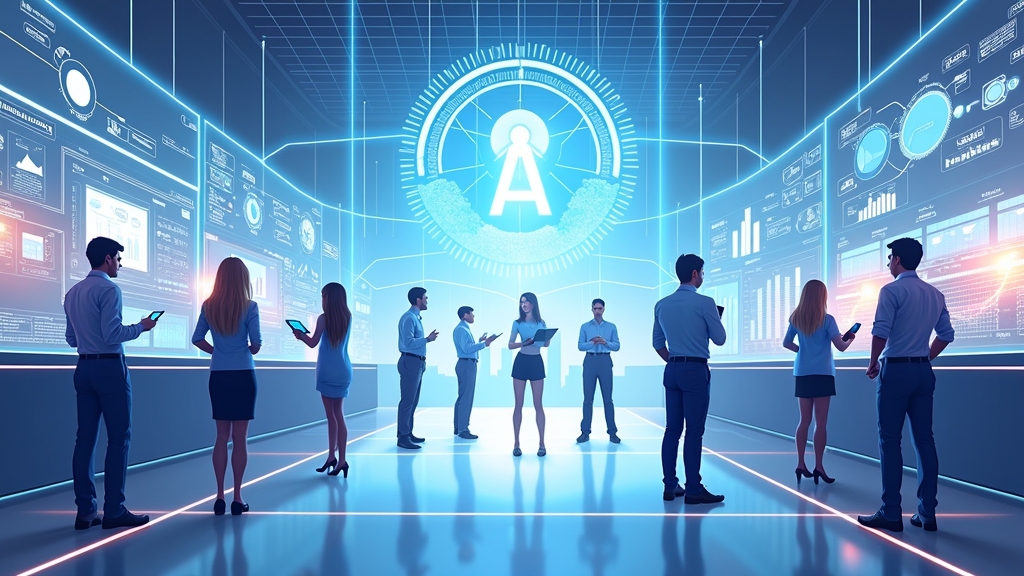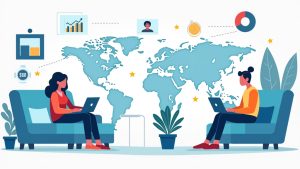Advertising
The Impact of Artificial Intelligence on Professional Retraining and the New Demands of the Labor Market
Artificial intelligence is transforming the job market in profound and irreversible ways. If you've ever wondered how to prepare for a future where machines perform tasks previously exclusive to humans, this article is for you. Let's explore how AI is shaping new professions, requiring reskilling and redefining skills valued in the 21st century.
How Artificial Intelligence is Changing the Job Market
AI is no longer a distant promise - it's already here, automating processes, analyzing data at scale and even making decisions. Companies like Amazon and Tesla use algorithms to optimize logistics and production, while tools like ChatGPT help with content creation and customer service. What does this mean for professionals? Simple: some functions are disappearing, while others are emerging.
A study of the World Economic Forum estimates that by 2025, automation will replace 85 million jobs but create 97 million new ones. The difference? These new jobs will require different skills. Professionals who previously worked with repetitive tasks, such as telemarketers or basic data analysts, will need to adapt to roles that combine technical knowledge and creativity.
But it's not just about replacement. AI is also expanding human capacities. Doctors use algorithms to diagnose diseases more accurately, architects use generative design software to create innovative structures, and teachers use adaptive platforms to personalize teaching. The challenge, then, is to understand how to position yourself in this dynamic scenario.
Have you stopped to think about how AI impacts your area of activity? If you haven't, maybe it's time to start. Keeping up with these changes isn't optional - it's a necessity for anyone who wants to remain relevant in the market.
The Need for Professional Retraining in the Age of AI
If a diploma used to guarantee a stable career, today continuous learning is essential. Professional retraining has ceased to be a differential and has become an obligation. But where to start? Online courses, bootcamps and certifications in areas such as data science, machine learning and automation are great starting points. Platforms such as Coursera, Udacity It is Alura offer accessible training in line with market demands.
A practical example is the financial sector. Banks are adopting AI for credit analysis and fraud detection, reducing the need for traditional analysts. However, vacancies are arising for specialists in fintechsdigital compliance and cybersecurity. Those who adapt survive. Those who resist are left behind.
In addition, behavioral skills - the so-called soft skills - have become even more relevant. Leadership, critical thinking and complex problem solving are skills that are difficult to automate. Professionals who combine technical knowledge and emotional intelligence will have a competitive edge.
Have you invested in your development recently? If not, perhaps it's time to rethink your strategy. The market doesn't wait, and those who keep up to date reap the rewards before others.
New Professions Created by Artificial Intelligence
While some jobs are disappearing, others are springing up at a rapid pace. What are these new careers? Positions such as machine learning engineerAI ethicists and chatbot trainers are on the rise. Companies are looking for professionals who not only understand technology, but know how to apply it ethically and strategically.
An interesting case is that of data scientist. A decade ago, this profession was practically non-existent. Today, it is one of the most highly valued, with salaries that can exceed R$ 20,000 a month. Another example is digital transformation managersThey are responsible for leading the adoption of AI in traditional organizations.
But you don't have to be a programming expert to benefit. User experience (UX) designers, SEO copywriters and even career coaches for technology professionals are finding opportunities in this new ecosystem. The key is to identify where AI creates demand and position yourself intelligently.

Have you considered migrating to one of these areas? If so, what steps have you taken to prepare? Remember: the future belongs to those who adapt quickly.
The Role of Companies in Employee Training
In the face of these changes, organizations also have a crucial role to play. Visionary companies are investing in upskilling It is reskilling to prepare their employees. Google, IBM and Microsoft, for example, offer in-house training in AI and cloud computing, ensuring that their teams are always up to date.
In Brazil, initiatives such as National Program for Access to Technical Education and Employment (Pronatec) and partnerships between companies and educational institutions are helping to reduce the skills gap. But there is still a long way to go. Small and medium-sized companies, in particular, need to adopt a continuous learning mentality if they are not to be left behind.
In addition, the organizational culture must encourage experimentation and error. Professionals who are afraid to innovate for fear of failure are unlikely to adapt to the changes brought about by AI. Leaders must promote environments where learning is valued and curiosity is rewarded.
Is your company preparing you for the future? If not, perhaps it's time to look for alternatives or even suggest internal changes. After all, collective success depends on individual evolution.
How to Prepare for the Future of Work
Now that we understand the challenges, how to prepare in a practical way? First, identify the trends in your area. Tools such as LinkedIn Learning and World Economic Forum can help map out the most in-demand skills.
Secondly, invest in flexible education. Online courses, webinars and mentoring allow you to learn at your own pace, without having to leave your current job. Thirdly, build a network of contacts with professionals who are already working in AI-related fields. Exchanging experiences can open unexpected doors.
Finally, stay curious. AI evolves quickly, and what is relevant today may be obsolete tomorrow. Following specialized blogs, participating in communities and experimenting with new tools are ways to stay ahead.
Have you already drawn up a professional development plan? If not, why not start today? The future belongs to the prepared.
Conclusion: Adapt or be left behind
Artificial intelligence is not a threat, but a powerful tool that can expand our capabilities. The key is to embrace change, invest in continuous learning and develop skills that complement - not compete with - technology.
The job market of the future will be shaped by those who know how to adapt. Are you ready to be part of it? The time to act is now.


